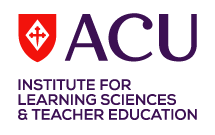Research on English and Literacies addresses all aspects of literacy education including traditional literacies and new forms of multimodal and digital literacy in the English curriculum and in other school curriculum areas. Research includes childhood and adolescent literacies outside of schooling for personal, aesthetic, intellectual, social, civic and political purposes.
Under the leadership of Professor Len Unsworth, the English and Literacies program has a particular interest in the nature and role of knowledge about the meaning-making resources of language, image, music movement, gesture and other modalities in interpreting and creating texts in contemporary paper and electronic media. The trajectory of this research embraces education from early childhood to senior secondary schooling addressing ongoing and emerging issues of equity in access to existing and new literacies of empowerment in the contemporary, increasingly online and multimodal, communication age.
This research at ILSTE reflects the multimodal conceptualisation of literacy in the Australian Curriculum: English and its emphasis on developing students’ meta-semiotic understanding to enhance their use of conventional literacies and new forms of digital, multimodal literacy practices.
Featured projects
AI Reading the World
Professor Kathy Mills is implementing an ARC research project to advance the teaching and learning of critical literacy with generative AI, and with extended reality technologies, like mixed reality.This project develops primary and secondary students’ critical literacy skills with generative AI chatbots, AI images, and with 3D virtual and mixed reality environments with our partner schools.
View project
Coding Animated Narratives as Multimodal Authorship
The ARC project seeks to develop new teaching pedagogies for students to code animated narratives, integrating previously separated capabilities of multimodal authoring and computational thinking. It prepares students for the emerging communication world where multimodal authoring, coding, and computational thinking will no longer be optional, but requisite in workplaces, education, and cultural life in a digital knowledge economy.
View project
Sensory Orchestration for Multimodal Literacy Learning in Primary Education
This project generates pedagogical and learning models to optimise students' broadened use of the senses in multimodal and digital literacy learning. It develops new sensory literacy programs with primary schools, community organisations, and art museums. The project builds an evidence base for students to become critical users of sensory techniques to communicate through digital, virtual, and augmented-reality texts — skillsets that sustain digital and workforce participation:
View project
ARC DP 25 – Mills - Critical Pedagogies for AI and Extended Reality (XR) Technology
This project aims to advance critical pedagogies to address gaps in uses of artificial intelligence and extended reality technologies – virtual, mixed, and augmented reality – for students’ multimodal literacies – key outcomes of the Australian curriculum. Existing critical and multimodal theories need expansion to account for artificial intelligence and extended reality technologies, requiring new teaching and learning capabilities and algorithmic knowledge for digital reading and authoring. It develops new critical pedagogies with teachers to advance primary and secondary students’ multimodal literacies. Benefits include advanced teacher and student capabilities, and critical pedagogies needed for Australia's social and economic future.

